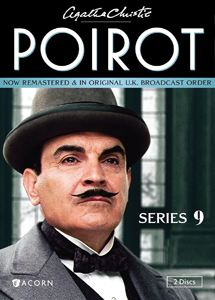“Poirot” Seasons 1-8 feature the cozy quartet of Poirot, Hastings, Japp and Miss Lemon and proven, skilled writers like Clive Exton and Anthony Horowitz. But starting with Season 9 (ITV, A&E) the crew sees massive changeover (all the writers and directors are new) and Poirot goes solo and grows melancholy. In most series, this would be a horrible miscalculation, but for “Poirot” it’s a change from one type of great show to another type of great show.
And it’s hard to argue that it betrays Agatha Christie’s work, because Hastings did indeed drop out of the novels about midway and Poirot went solo, except when teaming with his friend Ariadne Oliver (introduced next season).
David Suchet subtly alters his performance. We do see Poirot’s ebullient reaction to meeting old friend Colonel Race (James Fox) in “Death on the Nile,” and for some reason Suchet goes over-the-top in criticizing the killer in “Sad Cypress.” But Poirot has generally mellowed and become reflective – appropriate for four adaptations about (or seemingly about) love triangles leading to murder by the rejected party who can’t let go of the past.

“Agatha Christie’s Poirot” Season 9 (2003-04)
ITV and A&E, four episodes
Writers: Kevin Elyot, David Pirie, Nick Dear
Stars: David Suchet
Poirot speaks more French, smokes more cigarettes, keeps his mustache conservatively trimmed, approaches cases almost reluctantly, and expresses regrets. Like many fans, I’ve criticized the Sarah Phelps and Kenneth Branagh adaptations of the past decade for their radical interpretations of Christie’s texts, so I must admit “Poirot” itself starts the ball rolling. One character each in “Five Little Pigs” and “Nile” are changed to being gay, the argument being that Christie would’ve written them that way but couldn’t.
In the early 21st century, writers began to accept gay people into the realm of diverse culture, but they were far away from believing that Poirot could be romantically unattached yet still content. Several lines hint that Poirot is regretful and sad, presaging Branagh’s take. In “The Hollow,” he tells a beautiful young woman: “Your place is with the living. I will remain here with the dead.” Geez.
But while “Poirot” makes aggressive style choices starting with Season 9, it has not lost the Christie of it all. Indeed, the writers make sure to honor the focal point of these four novels: the emotion-driven psychology. And, while short on superstar names, the casting is impeccable as we watch four classy-yet-charged costume dramas, including one that might be the best “Poirot” episode, period.
Here are my rankings of the four episodes of Season 9. (SPOILERS FOLLOW.)
1. “Five Little Pigs” (episode 1, written by Kevin Elyot)
In pulling off this neat trick where “Poirot” excises Hastings, Japp and Miss Lemon yet has me loving the show more than ever, it wisely adapts one of the most emotional books. Poirot is our surrogate as he listens to the stories of a household of people who experienced the murder of artist Amyas Crale (Aidan Gillen) and the perhaps wrongful execution of his wife Caroline (Rachael Stirling) 15 years earlier.

Most challenging to longtime fans is director Paul Unwin’s style: extreme closeups in Poirot’s interviews, and a handheld camera that characters sometimes look toward, as if it represents another character. Jarring at first, it’s a way for us to observe these people intimately. And when the camera pans back to show the gauzily filmed events from 15 years earlier, it’s like a release to simpler times.
But also foreboding times. The unusual score by Christopher Gunning – surviving the staff turnover but not resting on his laurels – creates suspense rather than its opposite (mystery). It’s an ingenious choice, because viewers new to the yarn know Crale will be killed but not how, and once they know how, they don’t know who. Gunning’s score enhances the tragic inevitability of emotional (yet properly British) people in close proximity.
“Pigs” is brilliantly plotted — we have someone protecting someone that they wrongly think is the killer, and the actual killer taking advantage of this – and Elyot lets Poirot’s drawing-room tell-all play out. But the razor-sharp plot is often overlooked because the characters are equally sharp.
The casting is perfect as the love triangle between Amyas, Caroline and Elsa hits daylight-gothic beats of tragedy, pain, love, lust, beauty and artistry. Julie Cox shines as Elsa, a role that might’ve been played by Christina Ricci if this were an American production. She’s a beguiling young woman an artist would temporarily lose his senses for, with her physical beauty disguising her dangerous immaturity.
Novel: “Five Little Pigs” (1942)
2. “Death on the Nile” (3, Elyot)
When it comes to the Mount Rushmore of famous Christies – this, plus “Murder on the Orient Express,” “And Then There Were None” and “Witness for the Prosecution” – a viewer enters with both trepidation (“Why adapt it again?”) and excitement (“What will they do with this version?”).
Although Elyot goes dark with Poirot – he laments not having experienced romantic love, taunts the killer about the efficiency of the executioner and does nothing to stop the concluding homicide/suicide – this is generally a classy costume drama. It gives the flavor of the Egyptian and riverboat settings, even if it’s less expensive than the 1978 and 2022 versions.
More impressively, it casts every part with distinction (by today’s standards, the big name is Emily Blunt – unusually blonde — as Linnett Ridgeway) as we dive into highs and lows of romances much wavier than the River Nile. Some passengers find love; others try but fail.
Director Andy Wilson emphasizes the emotions while allowing a first-timer to soak up the suspects and possible motivations (which are actually unrelated side schemes of a lesser evil than murder). Meanwhile, a viewer familiar with the story can enjoy it for the hidden scheming between Simon (JJ Field) and Jacqueline (Emma Malin). Simon is less of a pathetic figure than in other versions, but it makes sense; in order to convince Linnett his love is genuine, he must be savvy.
The storytelling efficiency is impressive, as Elyot and Wilson unspool Christie’s classic in 97 minutes – a half-hour shorter than the cinematic versions – yet it never feels rushed. Some viewers might want more humor (1978) or darkness (2022), but this version lands in a pleasing middle ground.
Novel: “Death on the Nile” (1937)
3. “The Hollow” (4, Nick Dear)
Although the novel is a great Westmacottian piece, it’s also infamous for Christie wishing she hadn’t put Poirot in it. Although I’m glad he’s in it – so this episode can exist – I see her point, especially when it comes to the solving of the mystery. It’s so simple that if Poirot were to declare himself an “imbécile!” I’d agree this time.
The woman standing over the corpse with a gun is indeed the killer, and in an admittedly neat twist on “Murder on the Orient Express,” they didn’t all commit the murder, but they all conspired to protect the killer. Once Poirot knows who is related to whom – something awkwardly hidden from him and us – he easily figures it out.
But on the flip side, his deduction of the hiding place for the murder weapon (inside a sculpture) is random (wouldn’t it be more likely she’d throw the gun deep in the woods?), and it’s absurd how Poirot lets a known killer leave his sight in the denouement.
Those reservations aside, the marvelous cast plays distinct characters in this tragic situation, centered around John Christow. His description as a noble man who also regularly cheats on his wife – whom he married because, as he sees it, she needed him to look out for her — sounds insane, but it reads true on screen via the performance of “I’ve seen that guy before” actor Jonathan Cake.
Novel: “The Hollow” (1946)
4. “Sad Cypress” (2, David Pirie)
This is a prime example of a strong book being faithfully adapted yet not translating smoothly. The melancholy of Elinor (Elisabeth Dermot Walsh), and Poirot’s sympathy for her, give Christie’s novel a certain poetry. The mystery is relatively weak and backgrounded, but it doesn’t matter too much because I fell into Christie’s wallowing tone.
On TV, “Cypress” becomes a slow burn, which isn’t all bad except there’s not enough plot to lead to a boffo ending to reward our patience. The episode’s positioning after “Five Little Pigs” hurts because we realize Poirot’s relationship with Caroline Crale – whom he never met! – is at least equally strong to his relationship with Elinor.
“Yellowstone” fans might be excited that “Cypress” features Kelly Reilly as Mary, the woman who breaks up the engagement of Elinor and Roddy. But while the cast is fine, the relationships don’t pop – except that Walsh nicely portrays Elinor’s sadness over losing Roddy. But then, being jailed, she disappears from the screen and Poirot takes over – normally a good thing, but not here.
This is a rare case where the writer (it’s Pirie’s first episode) doesn’t know how to write the sleuth. Unable to use Hastings as an oblivious foil (which would automatically provide amusement), Poirot awkwardly puts on a solo show about how the sandwiches are a red herring for suspects he knows are innocent and had nothing to do with the sandwiches. I sense that Suchet – who goes almost as big as Ustinov in the final act — doesn’t believe in this material. Season 9’s only misfire, “Cypress” ends up a sad experience, but not for the right reasons.
Novel: “Sad Cypress” (1940)
IMDb Top 250 trivia
- “Poirot’s” 8.6 rating lands it at No. 151 on IMDb’s TV list.
- Voters like “Five Little Pigs” (8.4) the best, and “The Hollow” (7.7) the least.
- Like me, voters consider this to be the definitive “Death on the Nile.” It rates an 8.0, compared to 7.3 for Ustinov’s version and 6.3 for Branagh’s version.

